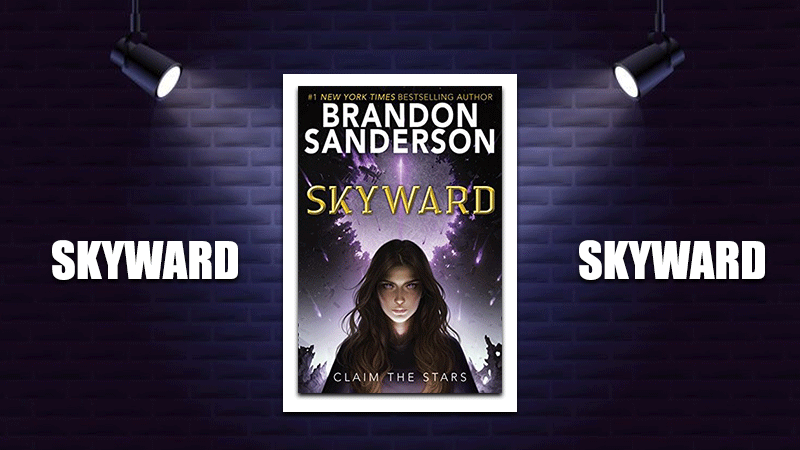Summary: In this Article, you’ll get to read about —
It was quite a shock to realize recently that I have grown out of the demographic I once loved and cherish, and, for the most part, still do. Like the shock of realizing I could have been having fun with a Croco Casino login this whole time, and wasn’t.
Young Adult novels were my gateway drug for reading in general. As I write, I am sitting next to a shelf with a well-worn set of Harry Potter books, with a bunch of Rick Riordan’s works buried around here somewhere. Yet beside those Harry Potter books are a bunch from the one and only Brandon Sanderson. As it stands, I’m a relative newcomer to his bandwagon, but I and my family have gorged our way through his catalog.
Most recently, we acquired Skyward, Brandon Sanderson’s YA sci-fi novel, deviating from the norm of his adult fantasy work, like the Stormlight Archive, his YA Superhero fiction called “The Reckoners”, and his middle-grade work, “Alcatraz vs the Evil Librarians”. So, among those titles, where does Skyward land?
Plot and Intrigue
Spin wants to fly. Trapped on the planet Detritus, humanity scattered into nomadic, underground clans, lest a race of aliens known as The Krell locate and wipe them out. Spin’s father is among the first pilots to form a militia determined to make a stand against the Krell so that humanity could unite and eventually rise up against them.
And when the first, truly pitched battle takes place, Spin is returning home when the most important battle in Detritus’ history takes place, and Spin’s father infamously broke formation and fled, forever branding his name as a coward.
It’s been years since that fateful day, and the legacy of her father’s cowardice still hangs over Spin’s head. Despite the insults, the looks, and the reputation, Spin doggedly pursues her dream of becoming a pilot and taking the fight to the Krell herself.
Yet her dream seems almost impossible when even Admiral Ironsides herself seems determined to do everything in her power to keep the daughter of a coward out of a cockpit.
Characters
Skyward, unlike a lot of Brandon’s other works, has a very tight core cast of characters whom the plot centers around. That means it’s very important for us, the readers, to connect with them.
In short, I like all of the characters, even the ones you’re supposed to dislike. Spin, her friends and fellow cadets, their mentor Cobb, and even Admiral Ironsides, all behave… well, if not rationally, then at least like how you’d expect children who are thrown into a high-pressure environment would.
I’m struggling to think of a character I disliked just as a character by how they were written, and to be honest, there aren’t any. Contrasted against every one of Sanderson’s other books in a similar vein, like The Reckoners or the Rithmatist, that’s actually quite impressive.
Prose
One of the reasons Brandon Sanderson is so popular, I think, is because of his highly streamlined prose. Older authors, like H.P. Lovecraft, Jane Austin, or Sir Arthur Conan Doyle, wrote with hyper-formal prose that can give hyper-headaches at times. More recent authors, like Patrick Rothfuss, prefer to get very flowery with their words. J.R.R. Tolkien and J.K. Rowling preferred to write their stories like fairy tales, giving a wondrous feeling to the story.
Brandon Sanderson, on the other hand, writes extremely concisely and efficiently. At every moment, you understand where the character is, who is speaking, how they are feeling, and what they are doing without being bogged down by pages and pages of descriptions and melodramatic angst.
Although I have found some snobby readers complain about it, I personally find it a delight to read. The words flow into my brain like a child on a slip-n-slide, instead of like me on a regular slide.
Sci-Fi and Magic
As a wise man once said, when you get far enough into the future, science might as well be magic. Skyward is full of science that might as well be magic. This is fine, since it’s very clear-cut what can and cannot be done with the technology at hand, and the story keeps within its own rules consistently. Brandon Sanderson is, after all, well known for his hard magic systems.
The Krell
While Brandon Sanderson is exemplary at concise prose, one thing he is not good at is concise storytelling. His most popular works often span hundreds of thousands of words, and every series he begins ends up having two sequels, a spin-off, and a prequel.
This often means that plot-relevant information gets left for the sequels to tie up, which is both good and bad. On the one hand, it gives meat for the sequels to dig through, since they have the time to go through it. On the other, it means that certain moments lose their meaning. This is a criticism I have with Sanderson’s novel, “Mistborn: The Final Empire”, where the main character draws upon a reserve of power that was as of yet unexplained in order to defeat the villain.
It makes sense in retrospect having finished the sequels, but it undermines the fight itself when the main character pulls out powers that weren’t explained.
Something sort of similar happens at the end of Skyward, although I think it was built up better than Mistborn, in all honesty.
However, the one that bothered me more was when a bunch of information gets dumped at the beginning chapter of the next book, which was supposedly revealed at the end of this book. When it wasn’t- not directly, at least. One of those details is what the Krell actually looks like, which never comes up in Skyward 1 either.
Skywards Ranking
So, where does Skyward go on the Sanderson hierarchy? Well, outside of the Cosmere books, I think it actually ranks quite well. Although I personally loved Steelheart, Skyward has to be at least as good, if not better, because of the worldbuilding. I do think it’s better than The Rithmatist but sits underneath the apex that is Sanderson’s Cosmere. So make of that what you will.
As a YA novel, I also highly recommend it. It’s easy to read, with likable characters put into serious, adult situations, and it makes complete sense why, in context, children are involved in the plot instead of the adults (a problem many YA novels struggle to answer, even my favorites, like Harry Potter or Percy Jackson).
8.5 / 10 If you’re in the right demographic, and you enjoy sci-fi, this book should be your jam.



